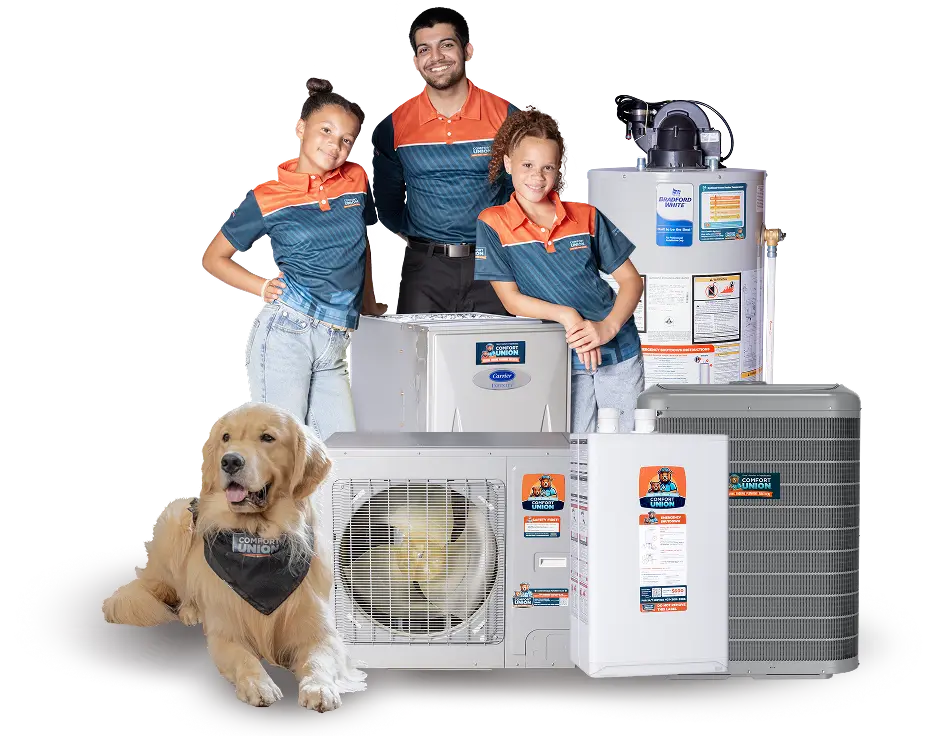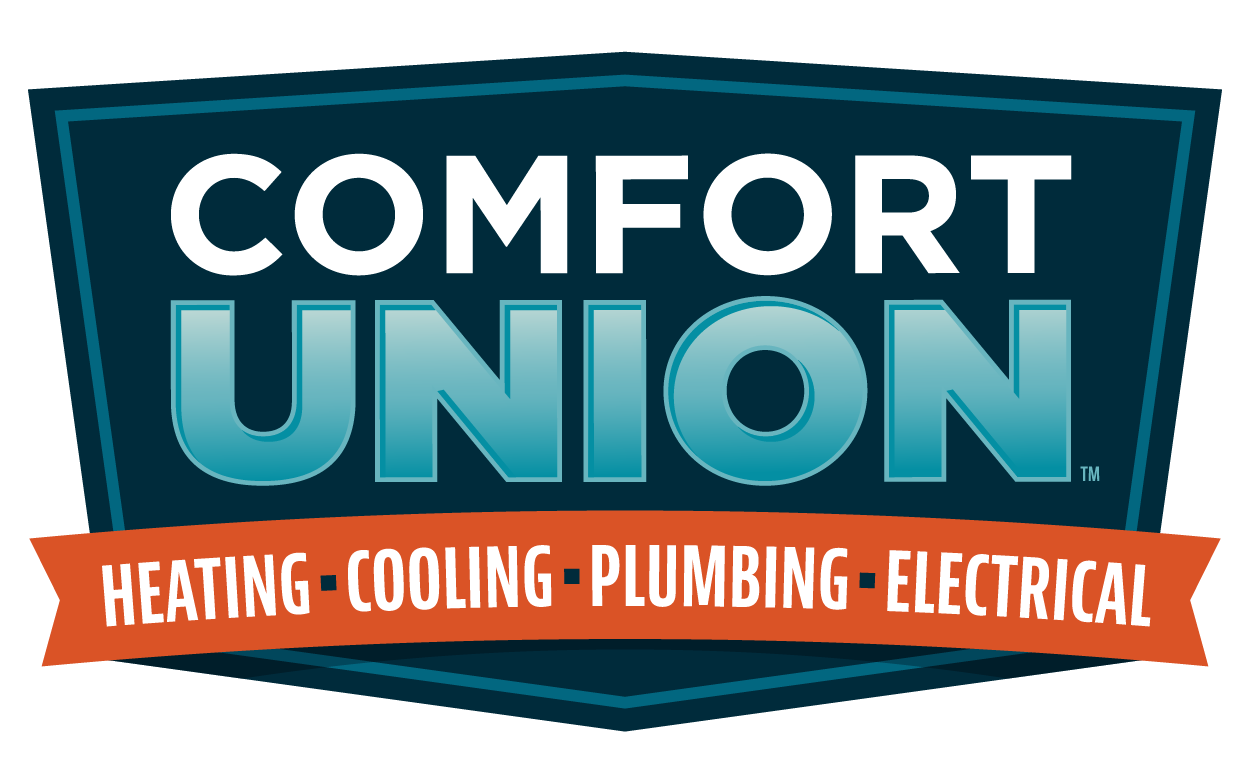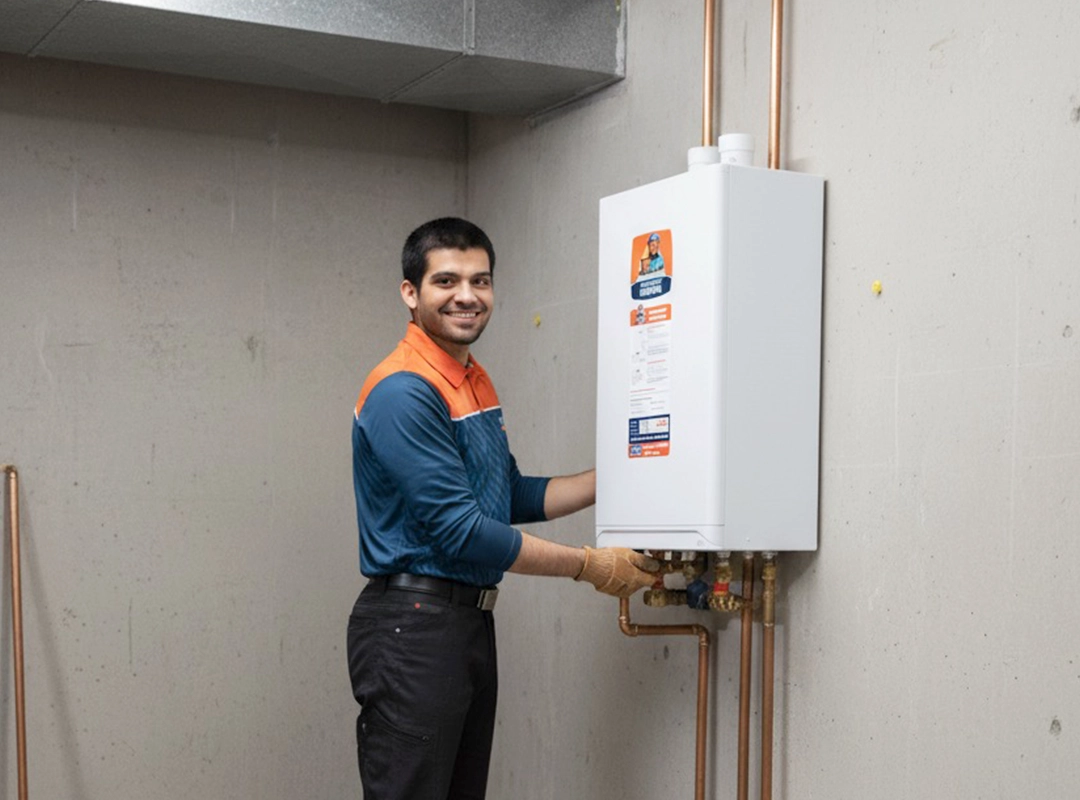As local HVAC specialists with years of experience servicing gas, electric, combi, and high-efficiency condensing systems, we know how Alberta’s hard water, heavy winter demands, and installation quality affect a boiler’s lifespan. This guide explains what Calgary homeowners can realistically expect, the signs a boiler is nearing the end of its life, and expert tips to help extend its performance.
Need a New Boiler?
With Flexible Financing Options

How Long Does a Boiler Last in Calgary?
With winter temperatures frequently dipping below –25°C, your boiler runs far more often than units in milder provinces. This extended workload directly impacts lifespan.
Across Alberta, most residential boilers last 15–25 years, but that range varies significantly based on:
- boiler type (gas, electric, combi, or high-efficiency condensing),
- maintenance history,
- exposure to hard water,
- and quality of installation.
Calgary’s long heating season, often 7+ months per year, means boilers age faster here than they would in cities like Vancouver or Toronto.
What Is the Average Lifespan of a Boiler?
Understanding how long boilers last requires looking at the boiler brands, design, and workload of each type:
High-Efficiency Condensing Boilers (15–20 years)
Condensing boilers deliver excellent efficiency but have more complex internal components, like aluminum or stainless steel heat exchangers, that require regular cleaning and tune-ups. These systems wear faster due to constant condensation cycles.
Standard-Efficiency Gas Boilers (20–25 years)
Older non-condensing boilers can last longer because they are mechanically simpler. While they use more fuel, their durability often lets them push past 20 years.
Electric Boilers (20–30 years)
Electric boilers have fewer moving parts and no combustion, so lifespan is often longer, provided the unit isn’t oversized or overworked.
Combi Boilers (12–18 years)
Combi boilers handle both home heating and hot water, working harder year-round. Because of this increased demand, they usually reach end-of-life sooner.
Local Factors That Affect Boiler Longevity in Calgary
Calgary homes have unique stressors that influence how long boilers actually last:
1. Calgary’s Hard Water
One of the biggest lifespan killers is mineral buildup from untreated hard water.
Scale accumulation inside heat exchangers restricts water flow, reduces efficiency, and forces the boiler to burn hotter than designed. Over time, this over-firing can crack the exchanger or cause catastrophic leaks.
Homes without softeners or water treatment systems see faster degradation.
2. Extreme Cold & Long Heating Seasons
During deep cold snaps, boilers often operate uninterrupted for hours or days. This marathon workload accelerates wear on pumps, valves, expansion tanks, and ignitors.
3. Quality of Installation
A boiler that’s incorrectly sized or poorly vented will short-cycle, overheat, or operate at pressures outside the ideal range—drastically shortening lifespan. Proper setup is one of the biggest predictors of longevity.
4. Annual Maintenance (or Lack Of It)
A boiler that never gets serviced rarely reaches the 15-year mark. Regular tune-ups inspect pressure, flush lines, clean exchangers, test sensors, and identify early failures.
Skipping annual servicing can reduce lifespan by 5–7 years.
Signs Your Boiler Is Nearing End-of-Life
If your boiler is 15+ years old and showing any of these symptoms, it may be entering the replacement window:
Frequent Repairs & Pressure Fluctuations
If you’ve had more than two boiler repairs in a year or experience recurring pressure drops/spikes, internal wear may be escalating.
Uneven Heat, Strange Noises, or Kettling
Banging, gurgling, and kettle-like noises indicate mineral buildup or partial blockages—both serious signs of aging.
Higher Heating Bills or Slow Heat Recovery
Efficiency drops sharply as boilers age. Rising bills with unchanged usage often mean the system is losing thermal efficiency.
Leaks or Corrosion Around the Boiler
Any sign of moisture, rust, or a corroded heat exchanger is a common warning sign that the boiler is deteriorating internally.
When Should You Replace a Boiler Instead of Repairing It?
There are two major decision-making rules that HVAC technicians use:
The 50% Rule
If a major repair costs more than 50% of the price of a new boiler, replacement is the more economical choice.
The 15-Year Threshold
After 15 years, repair frequency tends to increase, parts become harder to source, and efficiency declines sharply. If your boiler is older AND unreliable, replacement is recommended.
Obsolete or Unavailable Parts
Many older boilers use discontinued components. If your technician struggles to find compatible parts, or they are unusually expensive, replacement may be the only practical option.
How to Extend the Life of Your Boiler in Calgary

Annual Tune-Ups & Maintenance
A professional tune-up through our boiler repair and maintenance services ensures your heat exchanger, sensors, pump, and venting system are operating safely and efficiently.
Install Water Treatment or a Softener
Protecting your system from scale is one of the most effective ways to add 3–5 extra years of lifespan.
Flush the System Regularly
Removing sludge, iron deposits, and sediment keeps water flowing freely and prevents overheating.
Resolve Pressure Issues Quickly
Running a boiler at incorrect pressures accelerates pump and tank wear and reduces lifespan.
Boiler Lifespan FAQs
Can a boiler last 20 years?
Yes. Standard boilers often reach 20–25 years with proper water treatment and annual maintenance. High-efficiency boilers typically last 15–20 years due to more complex components.
What is the life expectancy of a residential boiler?
Most residential boilers last 15–25 years, depending on boiler type, boiler installation quality, and water hardness. With excellent care, some can exceed the 25-year mark.
How often should a boiler be replaced?
Most Calgary homeowners replace boilers every 15–20 years, or sooner if repair costs become frequent or energy bills spike.
Can I still replace my gas boiler after 2026?
Yes. You can still install and replace gas boilers after 2026. Regulations may encourage higher-efficiency equipment, but existing systems are allowed to remain in homes.
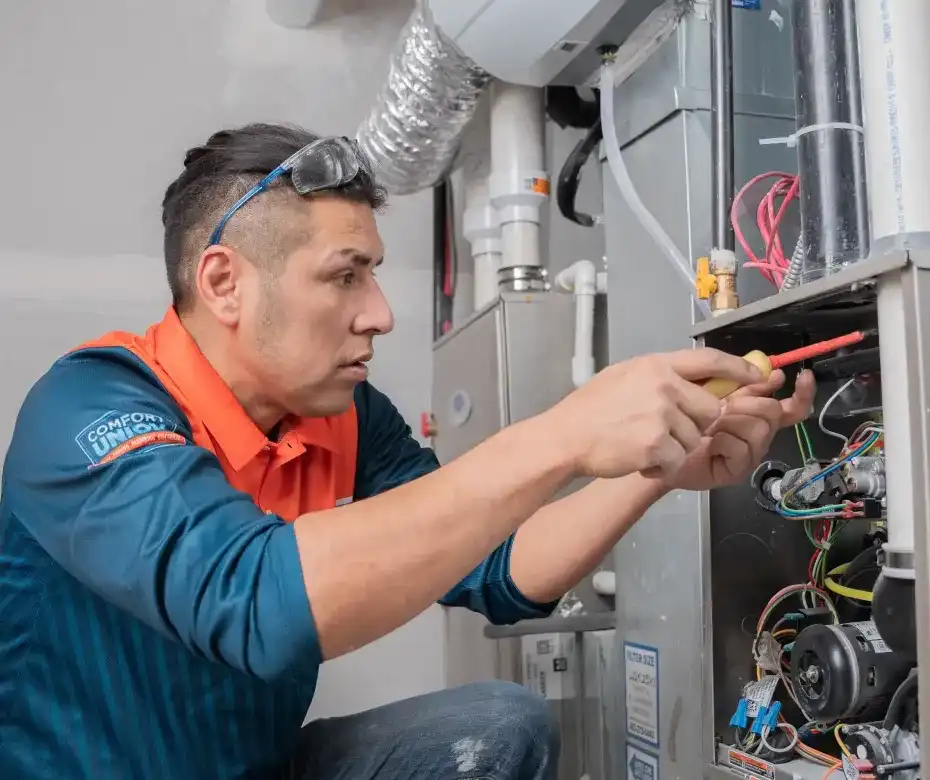
High-efficiency furnaces installed by licensed Calgary techs. Built for cold winters, backed by strong warranties. Perfect for families upgrading for comfort and savings.
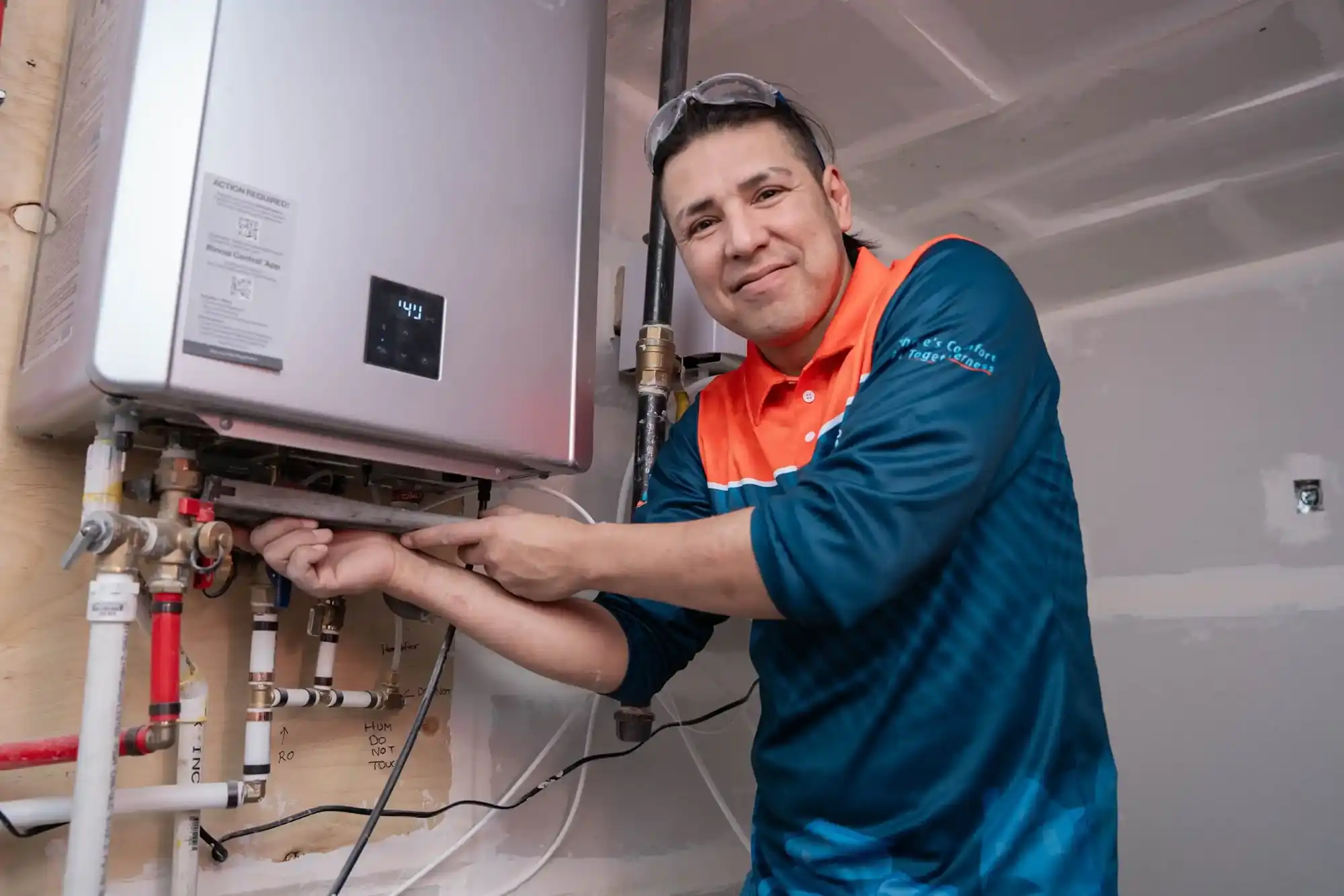
One smart system for home heat and hot water. Our Calgary team installs Navien and IBC combi boilers with expert care, space-saving design, and energy efficiency.

Losing heat or hot water? We diagnose and fix combi boiler issues fast with honest pricing, licensed repairs, and no surprise fees.
